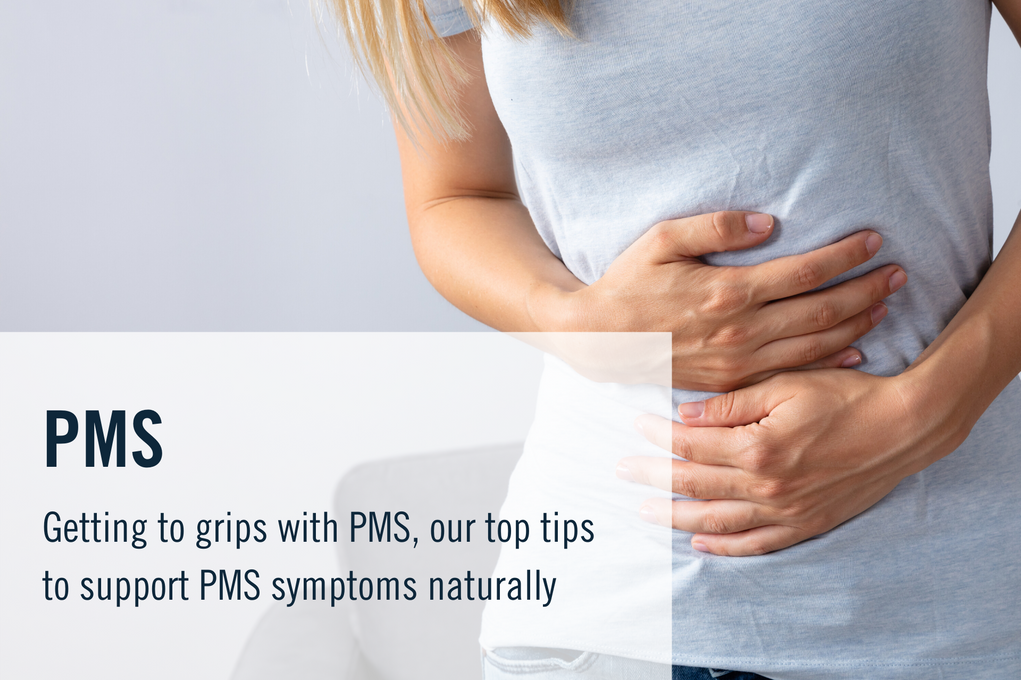Getting to grips with PMS & natural ways to support it
14th February 2020 / Health
Getting to grips with PMS & natural ways to support it
Emily Shannon

Premenstrual syndrome (PMS) is thought to affect 3 in 4 women. According to the National Association Of Premenstrual Syndrome, it is estimated that as many as 30% of women can experience moderate to severe PMS, with 5-8% suffering severe PMS/PMDD, this being around 800,000 in the UK.
What is PMS?
For most women, it’s an uncomfortable, frustrating and often inconvenient event that takes place every month. For others, no symptoms are experienced. There is no one size fits all approach to PMS, or any hormonal related issue for that matter, and addressing your symptoms and understanding their potential triggers and drivers, is key to understanding how you can support them.
On a more positive note, and something that we ladies try and remind ourselves here at Link HQ, is that the majority of the time, PMS is a sign that your reproductive organs are doing their thing, and so we try (where we can) to change our outlook on it. Also, there are certainly ways that you can help to support PMS naturally, and being supplement savvy is one of them!!
Understanding PMS
Firstly, in order to address individual symptoms it's important to understand what PMS actually is, and why many women experience it. PMS is a combination of physical and emotional symptoms that women experience just after ovulation and often just before the start of their period. The actual symptoms develop as a result of a sharp decline in estrogen and progesterone, with the symptoms usually experienced 5-7 days prior to menstruation.
It’s understood that the primary causes of PMS symptoms are thought to be a change in the level of reproductive hormones and neurotransmitters that are associated with the menstrual cycle. It’s thought that women that are most affected by PMS experience a drop in serotonin alongside a drop in estrogen. For some women, PMS can be severe and have a significant impact, for other women, the symptoms are much more manageable. The degree of PMS symptoms that you suffer is a good indicator of how well your hormones are balanced, so now is a good time to check in with your body, and look at which symptoms you are experiencing.
Symptoms of PMS
As we have mentioned, PMS will be different for all women. There are a number of factors that can influence the symptoms of PMS which include age, diet and medical conditions which are all important considerations. The most common PMS symptoms are listed below:
Physical symptoms
- Swollen or tender breasts
- Constipation or diarrhoea
- Bloating
- Stomach cramps
- Headache or backache
Emotional symptoms
- Irritability
- Feeling tired
- Trouble sleeping
- Appetite changes or food cravings
- Trouble with concentration or memory
- Tension or anxiety
- Mood swings
Natural ways to support PMS symptoms
It's thought that 90% of women will experience some of the common symptoms of PMS at some point during their lives, and here at Link Nutrition we believe it’s really important to find a way to help manage the symptoms naturally.
-
Sleep
It’s really important to listen to your body, after all, you know it best. Often when women experience PMS symptoms, resting and getting extra sleep can really ease the symptoms and help you to feel much better. Make sure that you don’t put pressure on yourself, women aren’t going to feel the same every day, so it’s really important to take a step back and listen to what your body is telling you. Hitting your personal sleep needs is key - we strive for 8 hours every night!
-
Gentle Exercise
Don’t worry, we certainly don’t mean any intense cardio at the gym - that’s certainly not going to help! Getting outside in the fresh air for a walk or a yin yoga class are both great ways to gently move your muscles which can help to ease the symptoms of PMS, allow you to get some fresh air and give you a moment to think. Towards the end of your period you can pick up with slightly more intense forms of exercise, but during your period, use this as a time hit that off button!
-
Reducing exposure to xenoestrogens
Xenoestrogens are molecules with a similar molecular structure to estrogen, which can bind to estrogen receptor sites. High exposure to xenoestrogens can worsen the symptoms of PMS and they can throw the natural hormonal balance off. Xenoestrogens can be found in medications, plastics and processed foods. Ditching plastic, swapping out your home cleaning products and cosmetics with natural alternatives, trying natural pain relief and avoiding processed foods will really reduce xenoestrogen exposure.
-
Tracking the menstrual cycle
Tracking your menstrual cycle can really help you to prepare for symptoms. It allows you to see which phase of the cycle you are at, so you can understand how you’re feeling when you’re feeling it. It will allow you to sit within the natural rhythm of your cycle and perhaps not put added pressure on yourself. We would definitely recommend using one - we love Clue App.
Our favourite foods to support PMS
A well-balanced diet packed with plenty of healthy fats to support female hormone production is a great place to start! It’s important to make sure you’re also eating plenty of quality protein, green leafy vegetables to support detoxification and keep your minerals (especially magnesium) topped up. Try to avoid high, refined sugar foods as these will throw blood sugar levels out of balance and can often make symptoms worse. Caffeine can also worsen symptoms so try to avoid drinking too much if possible! But, don’t worry! Now is definitely the best time to start embracing good-quality dark chocolate! Yes, you heard that right, it’s packed full of magnesium which helps to support PMS!
Here’s a list of some of our favourite PMS-friendly foods!
- Dark leafy greens (kale, broccoli, chard)
- Salmon
- Avocado
- Eggs
- Nuts and seeds (we love flaxseeds and almonds)
- Dark chocolate (the best quality possible!)
How Link Nutrition Supplements can help
Supplementation can really help to support estrogen metabolism which plays a key role in managing the symptoms of PMS. Below are the most important supplements in our range that could help.
-
Magnesium
Magnesium should be your best friend when it comes to beating PMS symptoms. Magnesium has been shown to help to reduce menstrual cramps, reduce premenstrual bloating by helping to target fluid retention and even help to boost mood. If you want to find out more about our Food Based Magnesium, you can find it here. Magnesium can also help to support sleep, it’s really important to prioritise sleep, though some women do find it difficult to sleep as a result of fluctuating hormone levels, so our Food Based Magnesium can really help!
-
B Complex
Vitamin B6 supplementation has been shown to combat PMS symptoms, particularly symptoms that are associated with low mood. A study found that when taken with magnesium, vitamin B6 promotes mood-enhancing effects by helping the brain to release serotonin. Find more about our B Complex here.
-
Synbiotic 7
Maintaining a healthy gut flora with our Synbiotic 7 can really help to manage and support the symptoms of PMS. Supporting gut bacteria and maintaining a good microbial community can help to normalise estrogen levels and hormone metabolism. You can find our Synbiotic 7 here.
From The Blog
-

25th February 2025 / Health
Empowering Women’s Health: Key Supplements for Well-being
Women’s health is a lifelong journey, with each stage presenting unique nutritional and wellness needs. From maintaining energy levels to supporting hormonal balance and bone health, the right comb...
Read article -

17th February 2025 / Health
Empowering Women’s Health: Lifestyle Tips and a Key Supplement for Perimenopause and Menopause
NaomiWomen’s health evolves through various life stages, and the transition into perimenopause and menopause brings unique challenges. During these phases, hormonal fluctuations can lead to symptom...
Read article -

10th February 2025 / Health / Products
The Best Foods and Drinks to Help Your Body Recover from Burnout
Burnout is a growing issue in today’s fast-paced work culture, leaving many people feeling exhausted, overwhelmed, and depleted. While rest and self-care are essential, nutrition plays a crucial ro...
Read article



